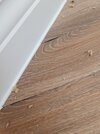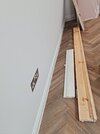Hi all.
A customer had LVT flooring laid when converting her first floor maisonette flat in to a 2 story flat. Where the flooring meets the skirting on the exterior walls the are sections that are lifting slightly.


Her surveyor thinks that it is the result of deflection- by which he means that the flooring joists have twisted. I have no idea if that is true or not.
Can I simply "inject" some flooring adhesive and put a weight over the top until the adhesive sets? I have loads of adhesive after having to replace some damaged sections. For what it is worth, you can push the LVT down, but it pops up once you cease to apply pressure.
A customer had LVT flooring laid when converting her first floor maisonette flat in to a 2 story flat. Where the flooring meets the skirting on the exterior walls the are sections that are lifting slightly.


Her surveyor thinks that it is the result of deflection- by which he means that the flooring joists have twisted. I have no idea if that is true or not.
Can I simply "inject" some flooring adhesive and put a weight over the top until the adhesive sets? I have loads of adhesive after having to replace some damaged sections. For what it is worth, you can push the LVT down, but it pops up once you cease to apply pressure.

